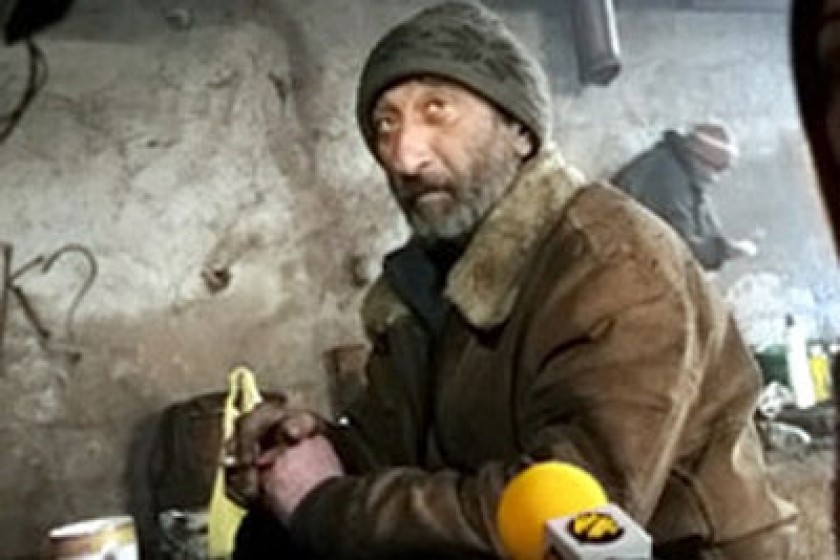
The Best Homeless Person
It was possible that another bomzh died in the basement and the emergency services$ had came to take him, the tenants of Artsakh Street #8 probably thought when they saw an ambulance approaching their apartment building on the request of journalists. They even followed the events unfolding below with great interest from windows and the building's main entrance, and didn't miss out on the opportunity to complain about how the homeless intrude on their lives.
They spoke about how many times they wanted to lock the door to the building's basement so that they couldn't enter.
"What are people doing in the basement?" asked one angry woman. "Did we reinforce the foundation of the building two years ago so that others could come and enter the basement?" Of course, the question as to where the homeless should go when they don't have shelter didn't bother her much. "Wherever they want," she replied. "To a hostel or somewhere else. Our children grow up here."
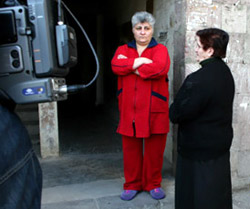 |
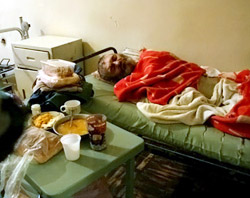 |
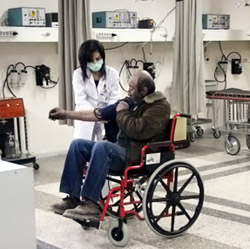 |
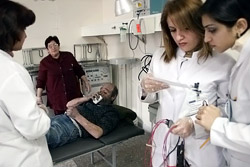 |
Meanwhile, a doctor was examining Hrant in the basement. (See also:The Homeless Pray to Survive the Winter). His legs were completely frozen below the knee and he could hardly walk. "Even during the war my feet got frozen and staying outside, it became worse," Hrant explains. "For these past two days it is very bad. Nothing like this has happened before."
It was the first time that Hrant had spoken about the war. He had never done so before. For four years he participated in the Artsakh liberation war, serving in the military commanded by Monte Melkonyan in the Martuni Region of Karabakh. He took part in the fierce battles that were waged around Aghdam and Fizuli.
"I lost my documents somewhere outside," he says. "I don't have them now, but if you ask for them from the Erebouni Regional military department they'll give you some. Maybe we'll need them in hospital."
"As a freedom fighter, has the state helped you?"I ask. "No," responds Hrant. "What should the state have done?"
"You fought for the homeland. Don't you regret it now?"
"Why should I regret it?" he says.
Hrant has been on the streets for 6 or 7 years already and hasn't got a home. He hasn't had one since 1988 when he left Baku for Armenia. Instead, he lived with his wife and child at the home of a relative in Kapan. Then divorce and the war decided his fate. "How do you live?" I ask. "Like this, I come to drink tea and some kids from the building bring me bread and other food."
The Kids call him "dyad"(uncle).
"He is the best among the homeless of this area," says one of the local children who eventually escorted Hrant to the door of the waiting ambulance. "Every morning he washes with spring water and changes his clothes. Every day we come and talk to him because he tells us interesting things about the war,"kids of the yard describe Hrant.
The freedom fighter was taken to the Erebouni Medical Center where the doctors said that apart from his legs he has problems with his heart. However, the test with requires special equipment is so expensive so in Hrant's case, they can't do it unless a donor can be found. The hospital can't also supply patients with food while they are in hospital and assistance is also needed for that.
Freedom fighter Hrant will stay in hospital for a few days, but after that, his fate is uncertain.
P.S. We want to thank the "SQUAREONE" bistro who agreed to provide Hrant with food for his stay in hospital when we approached them.
Irina Hovhannisyan
Photos by Onnik Krikorian
 Videos
Videos Photos
Photos




Write a comment